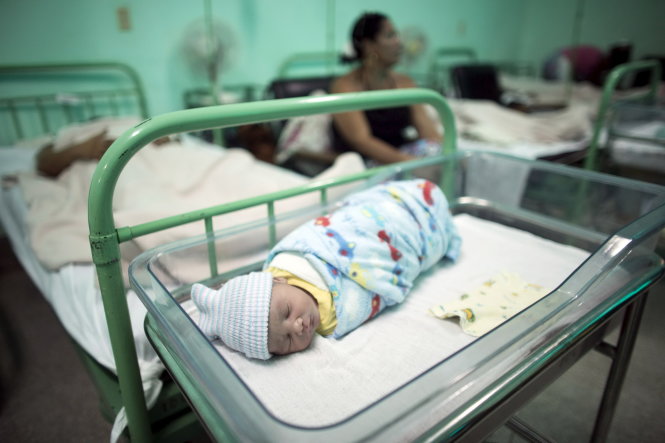Cuba - The first country to successfully prevent mother-to-child transmission of HIV
On June 30, Cuba became the first country in the world to take measures to prevent the transmission of HIV and syphilis from mother to child in pregnant women.
Cuba successfully prevents mother-to-child transmission of HIV
According to AFP, the director general of the World Health Organization Margaret Chan said: 'Eliminating the risk of virus infection is one of the greatest achievements in the field of public health care. This is a great victory in our long war with the HIV-AIDS epidemic and sexually transmitted infections. This is also an important step for us to look forward to a generation without AIDS. '

A newborn boy lying near his mother, Dailyn Fleite (29 years old, left) at a hospital in Camaguey, Cuba - Photo: Reuters
According to health sector leaders, overall health care, improving the quality of testing and strengthening care in fertility care are factors that have contributed to the success of nearly 50 cases. HIV infection or syphilis from mother to child out of 100,000 births.
However, because antiretroviral treatment measures to prevent mother-to-child transmission of HIV have not yet reached 100% effectiveness, the probability of failure is still small.
The achievements of Cuban medicine according to WHO health experts have contributed to reducing the infection rate to very low levels, to the point that it is no longer a problem for the medical industry.
According to the WHO 's announcement , since 2010, health leaders have joined Cuba to undertake early diagnosis in antenatal care, HIV and syphilis testing for pregnant women and their husbands. , treating people who test positive and for both babies in the womb, implement a caesarean section and find breast-feeding alternatives for pregnant women.
Carissa Etienne, director of the Inter-American Health Organization, said: ' Cuba's success shows that with all-inclusive solutions, we can fully address many of the challenges of HIV, such as HIV.'
Around 1.4 million pregnant women worldwide get pregnant every year. If left untreated, they have 15-45% chance of infecting their babies during pregnancy, childbirth or breastfeeding. However, if treated with antiviral drugs for both mother and child, the risk of infection is just over 1%.
In 2009, the number of children infected with HIV at birth was 400,000. 2013 dropped to 240,000 cases.
- Thailand - the first country in Asia to prevent HIV transmission from mother to child
- Cuba successfully abolished mother-to-child HIV infection
- Thailand becomes the first Asian country to eliminate mother-to-child transmission of HIV
- False nipples prevent mother-to-child transmission of HIV
- Care and treatment for babies born to mothers with HIV / AIDS
- Found the Zika pathway transmitted from mother to child
- In what ways is HIV transmitted?
- Debate about children created by three people
- Interesting little facts about Cuba
- Cuba successfully fabricated anti-cancer vaccines
- Cuba successfully developed a lung cancer vaccine
- Successful breeding babies have 3 parents
 Green tea cleans teeth better than mouthwash?
Green tea cleans teeth better than mouthwash? Death kiss: This is why you should not let anyone kiss your baby's lips
Death kiss: This is why you should not let anyone kiss your baby's lips What is salmonellosis?
What is salmonellosis? Caution should be exercised when using aloe vera through eating and drinking
Caution should be exercised when using aloe vera through eating and drinking